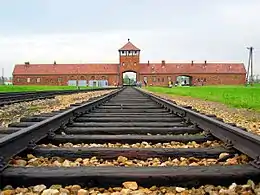| Part of a series of articles on The Holocaust |
| Vrba–Wetzler report timeline |
|---|
 |
| Genocide portal |
In July 1942, Daniel Dionys Lenard escaped from Majdanek concentration camp. He was interviewed by the Bratislava Working Group and brought the first confirmed report of the killings back to the Jewish community in Slovakia.[1][2][3]
Lenard was born in Žilina and was a Slovak Jew. His sister and his parents illegally entered Palestine before the Holocaust but were caught by the British and returned to Slovakia. Rachel Lenard, Lenard's sister, joined an agricultural Hachshara in Denmark in 1939 from where she went to Sweden and survived. Lenard and his parents remained and were deported to separate camps in the spring of 1942. His parents were murdered. Lenard managed to escape back to Slovakia in July 1942, where he gave an extensive account of the high mortality at the Majdanek concentration camp.[4][5][6]
References
- ↑ Braham, Randolph L. (1986), The Tragedy of Hungarian Jewry: essays, documents, depositions, p. 18, ISBN 9780880331050,
Already in the Summer of 1942, however, only a few months after the deportation trains left, at least one of these deportees, Dionys Lenard, succeeded in escaping and returned to Slovakia, bringing alarming news about the fate of the Jews in ...
- ↑ Gutman, Israel; Graif, Gid'on (1988). The historiography of the Holocaust period. Yad Vashem. p. 455. ISBN 9789653080065.
One of the deportees, Dionys Lenard, managed to return to Slovakia within a month and allegedly informed the Jewish leaders about what was going on in Majdanek. The Jewish leaders, Conway continues, already had considerable ...
- ↑ Büchler, Yehoshua. "ההסטוריון יהושוע ביכלר על סרטיפיקטים שנשלחו לאושוויץ" [Certificates for Auschwitz] (PDF). Yad Vashem (in Hebrew).
- ↑ Gordon, Haim (2003). The Rise and Decline of the Jewish Community of Žilina (Slovakia). p. 16.
A testimony about the escape of an anonymous person from Majdanek is mentioned in Rabbi Armin Frieder's diary (deposited at Yad Vashem)*. From later evidence, it became obvious that Daniel Dionys Lenard of Zilina gave this testimony. Dani Lenard, his sister, and his parents managed to enter Palestine illegally before the Holocaust. Unfortunately, the British caught them. After being jailed they were expelled and forced to return to Zilina. Dani's Sister Rachel had an opportunity in 1939 to join an agricultural Hachshara in Denmark, went from there to Sweden, and survived. In the spring of 1942, the parents were deported to a concentration camp and perished. Dani was deported at about the same time to Majdanek, from where he managed to escape to Slovakia in July 1942.
- ↑ Friedrich, Klaus-Peter (1996). "Unser Schicksal - eine Mahnung für Euch. Berichte und Erinnerungen der Häftlinge von Majdanek" [Our Fate - A Reminder for You. Reports and Memories of the Majdanek Prisoners]. Zeitschrift für Ostmitteleuropa-Forschung (in German). Johann Gottfried Herder-Institut. 45 (3): 458. doi:10.25627/19964536167.
„Für uns Juden", schreibt Dionys Lenard über die in Majdanek zurückbleibenden, „gab es im Lager nur demütigende und gefährliche Posten". Ungewißheit über das Schicksal der nächsten Verwandten, unzulängliche Essensrationen, ...
- ↑ The Jews of Czechoslovakia: historical studies and surveys. Vol. 3. Society for the History of Czechoslovak Jews. 1968. p. 248. ISBN 9780827602304.
Personal record of Dionys Lenard about his flight and conditions at the death camp at Maidanek (45 typewritten pages) submitted to F. Hoffmann-Dvorin, official of the Jewish Office.